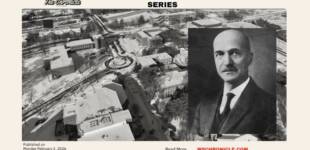Clinton or Sanders: What Would Dr. King Say?
Hillary Clinton and Bernie Sanders
Bill Turner
Guest Columnist
Most blacks who will vote in the Democrat primaries for the 2016 presidential campaign would vote for Bernie Sanders if they followed the logic of a speech Dr. Martin Luther King gave in NYC’s Riverside Church on April 4, 1967. In candid and unpretentious language in a speech titled “Beyond Vietnam: A Time to Break Silence,” Dr. King spoke about the straight correlation between income inequality at home and the inclination toward war abroad. His words were quite revolutionary and condemned widely. The policies proposed by Democrat presidential candidate Senator Bernie Sanders, especially his resolute focus on “a political revolution,” rebounds from the echo chamber of Dr. Martin Luther King, Jr.
In a little-known speech delivered a year before he was killed, Dr. King made clear that he was much more than a mesmerizing dreamer, a pragmatist, a run-of-the-mill centrist or a simple reformer, labels Sanders puts on his rival, Hillary Clinton.
Although then FBI Director J. Edgar Hoover had already labeled him “the most dangerous man in America,” Dr. King, speaking before a group called Clergy and Laymen Concerned about Vietnam, revealed himself as a revolutionary. “We are deeply in need of a new way beyond the darkness that seems so close around us. I call for radical departures.”
Of the Vietnam War, King said – as Sanders is heard to say about the present-day tendency America has to be the world’s police – “We are a society gone mad on war, and America will never invest the necessary funds or energies in rehabilitation of its poor so long as adventures like Vietnam continue to draw men and skills and money like some demonic destructive suction tube. So, I am increasingly compelled to see this war as an enemy of the poor and to attack it as such.”
King wondered aloud about young black men who “were sent eight thousand miles away to guarantee liberties in Southeast Asia which they had not found in southwest Georgia and East Harlem.” Such a remark was revolutionary, especially to black ministers who thought the civil rights movement was a separate issue from the anti-war movement. Dr. King doubled down, calling the Vietnam War “a cruel manipulation of the poor.”
Like Dr. King’s reference to “Americans as strange liberators,” candidate Sanders says “The test of a great and powerful nation is not how many wars it can engage in, but how it can resolve international conflicts in a peaceful manner. I will move away from a policy of unilateral military action and regime change, and toward a policy of emphasizing diplomacy, and ensuring the decision to go to war is a last resort.”
When Sanders calls for a $15-an-hour minimum wage, he is pointing to our fellow Americans whom Dr. King called “God’s desperate, rejected, suffering, helpless and outcast children, the weak, the voiceless, the victims of our nation.”
Sanders takes his call for revolution from the words of the late John F. Kennedy who in 1962 said, “Those who make peaceful revolution impossible will make violent revolution inevitable.” King repeated those words five years later, going on to challenge “those who make peaceful revolution impossible by refusing to give up the privileges and the pleasures that come from the immense profits of overseas investments. I am convinced that if we are to get on the right side of the world revolution, we as a nation must undergo a radical revolution of values.” Dr. King headed toward his planned “Poor Peoples Campaign” in 1968, a year after this speech focused then on conquering what he called “the giant triplets of racism, extreme materialism, and militarism.”
It’s easy to celebrate Dr. King’s preaching every January; it’s another to support a politician like Sanders, who dreams as he did. That requires revolutionary resolve. Bernie Sanders promotes policies that are logical extensions of where Dr. King was headed before he was silenced in Memphis: the gap between the very rich and everyone else, a livable minimum wage, universal health insurance, protection of the environment, and reins on corporate greed. Sanders seeks to lead a peaceful political revolution of the magnitude of Dr. King’s Dream, at the end point of which “justice will roll down like waters, and righteousness like a mighty stream.” Somebody needs to tell Democrat voters, especially blacks, who see Secretary Clinton, not Senator Sanders, as the practical way to realize The Dream. Apparently Dr. King – in the form of Bernie Sanders – is still way ahead of his time.
Dr. Bill Turner is a noted educator, writer and thinker who called Winston-Salem home for many years. Reach him at bill-turner@comcast.net.









